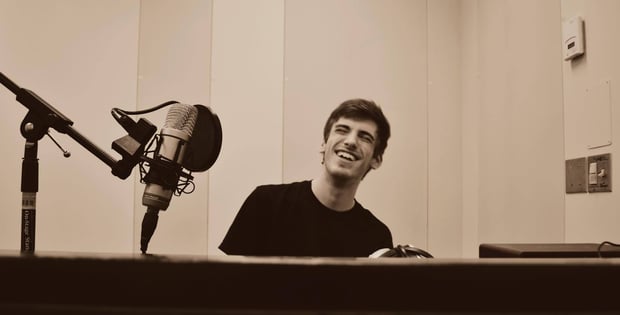 Image courtesy of the artist
Image courtesy of the artist
In our normal lives, we often live day by day not thinking about "the bigger picture": death, pain, accidents, suffering. I mean, it sounds like a bummer, right? Sadly, those experiences can hit you at any moment and change your world. Boston-based singer-songwriter Tristan Bouchard had his life flipped upside down after witnessing a horrific accident. And while it took him some time to sort through his experience, he's used music as a way to navigate through the trauma. Not only has music been a rock for him, but he’s even begun raising money through his music for nonprofits dedicated to mental health. There's no question that music has the power to heal, but Bouchard is taking the next step by pairing music with helping the greater good.
A few years ago, you witnessed a traumatic accident – we can only imagine how hard that must have been. What happened, and how did it affect you?
About three years ago, I witnessed a fellow student at Boston University killed by a truck taking a turn onto Commonwealth Ave. The accident left me with post-traumatic stress disorder, which naturally altered my entire reality. For quite a long time, I wouldn't get out of bed and later developed insomnia I've only recently shaken. That being said, much of the upcoming album's content takes inspiration from that very intense time in my life.
How has your relationship with music evolved since that accident?
I started looking for different things in music after the accident. For a while, I wanted very direct, clear lyrics and melodic music, probably wanting order in my life. Later, I discovered a love for music from Cuba, which transformed the way I see music. Its exuberance was exactly what I was looking for at the time, and its chaotic rhythm and brass proved to be more healing to my new state of mind than order ever was.
In terms of my own music, I wound up altering every single song in some ways to reflect the traumatizing effect of highly populated urbanized living in my mind (though some thrive on it). I found I also had to work harder as a writer to capture more difficult and volatile emotions.
You mentioned to us that you've also been battling extreme stage fright from a young age. What scares you about performing, and what motivates you to do it anyway?
"It never goes away completely" is the thought that keeps me going, oddly enough. I had to learn to accept my emotions, which included fear and various anxieties. If I didn't learn to accept my emotions, I would never go on a stage again. I think rejection is the most fearful thing about it, even though I really am of the belief that an audience wants you to succeed.
[5 Strategies to Overcome Stage Fright]
What methods have been most effective for you in overcoming stage fright?
Meditation has been the most useful to me. Examining one's own thoughts, including the chaos one experiences before a performance, is extremely calming to me. As if simply noticing and labeling the thoughts helps to mollify the fear.
You raised an impressive $11,000 for your debut album, Blue Nights, with a good portion of the funds going to a mental health hospital. Why did you decide to tie your music to this particular cause, and how did that partnership come about?
My best friend happens to work at this mental health facility and tells me incredible things about the work they do. It seemed only right that, with an album so obsessed about the repercussions of PTSD, that I somehow give back to promote research and better methods to help those suffering. More simply put, I know how tough it can be.
What advice would you give to musicians looking to pair their music career with a nonprofit initiative? How would you suggest they go about raising awareness and funds while still making it about the music?
I would simply say that if your music and career can help someone, let it. Often that means promoting dialogue about social, political, and economic issues, and quite often one discovers all the nonprofit resources around them. And I think it's simply a matter of artistic integrity in terms of keeping "it about the music." Just remember that behind every donation and every interaction, there is a human being, and to always make everything you do about engaging more fully with mankind.
[Indie Artists: Here Are 3 Realistic Ways to Support a Cause You Believe in Through Your Music]


